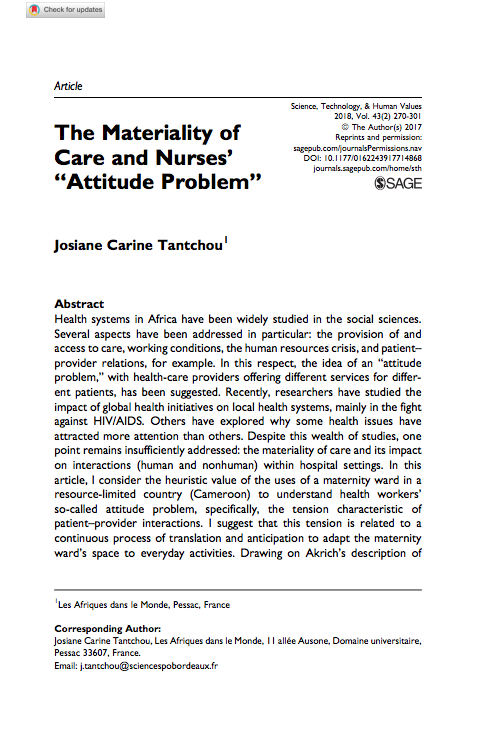
Abstract: "Health systems in Africa have been widely studied in the social sciences. Several aspects have been addressed in particular: the provision of and access to care, working conditions, the human resources crisis, and patient–provider relations, for example. In this respect, the idea of an “attitude problem,” with health-care providers offering different services for different patients, has been suggested. Recently, researchers have studied the impact of global health initiatives on local health systems, mainly in the fight against HIV/AIDS. Others have explored why some health issues have attracted more attention than others. Despite this wealth of studies, one point remains insufficiently addressed: the materiality of care and its impact on interactions (human and nonhuman) within hospital settings. In this article, I consider the heuristic value of the uses of a maternity ward in a resource-limited country (Cameroon) to understand health workers’ so-called attitude problem, specifically, the tension characteristic of patient–provider interactions. I suggest that this tension is related to a continuous process of translation and anticipation to adapt the maternity ward’s space to everyday activities. Drawing on Akrich’s description of technical objects, and Lussault’s pragmatics of space, I attempt to show that in this context, care is also an art of tinkering with unpredictable bodies in unstable hospitals’ spaces."
Keywords: materiality, care, space, health workers, Cameroon
Josiane Carine Tantchou, "2017. Tantchou. "The Materiality of Care and Nurses’ “Attitude Problem”"", contributed by Angela Okune, STS Infrastructures, Platform for Experimental Collaborative Ethnography, last modified 19 July 2018, accessed 27 July 2024. http://www.stsinfrastructures.org/content/2017-tantchou-materiality-care-and-nurses’-“attitude-problem”
Critical Commentary
AO: This 2017 article by Josiane Carine Tantchou looks at the materiality of care and its impact on interactions (human and nonhuman) within hospital settings.